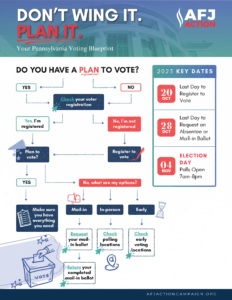2025 States to Watch: Pennsylvania

Pennsylvania Supreme Court Election
Pennsylvania’s statewide judicial system is comprised of minor courts such as municipal courts or magistrate courts, trial courts, and appellate courts. The trial courts are the courts of common pleas; these courts are comprised of 60 judicial districts. Then the intermediate appellate courts in the Pennsylvania are the superior court, which hears criminal and civil appeals from the common pleas courts, and the commonwealth court, which hears cases brought against the Commonwealth or directly hears state agency appeals.
Pennsylvania is holding retention elections for three supreme court justices, an open contest and retention election each on the superior and commonwealth court, and 65 common pleas judges this year on November 4, 2025. Learn about the lower court races here.
The supreme court retention election is especially notable as those courts deliver decisions every day impacting various social justice issues, including voting rights, environmental health, and reproductive freedom. Their decisions set the tone for what rights Pennsylvanians can and cannot exercise, showcasing their crucial influence in the courts and beyond.
About the Pennsylvania Supreme Court
-
Pennsylvania selects its supreme court justices by partisan election for each justice’s initial term. To remain on the bench, justices must stand in retention elections. In 2025, there will be three state supreme court justices up for retention election.
In Pennsylvania, supreme court justices are elected to serve a 10-year term. However, if there is a vacancy in the court, the governor will appoint an interim justice to fill the vacancy, who the state Senate must confirm. Interim justices appointed in this way must stand for election at the next election cycle occurring no more than 10 months after the vacancy. Retention elections are uncontested elections in which voters select “yes” or “no” for each judicial candidate. Each candidate must meet a certain threshold of “yes” votes to determine if the justice remains on the bench. If the judge receives a majority of “yes” votes, they will be retained to serve for another 10 years. However, if a majority of voters vote “no,” the seat becomes vacant, the governor will nominate a replacement justice that must be confirmed by the State Senate.
Seven justices serve on the Pennsylvania Supreme Court. Currently, Democrats hold a 5-2 majority, as Justices Christine Donohue, Kevin Dougherty, Daniel McCaffery, Debra Todd, and David Wecht ran as Democrats for their initial terms to the bench.
-
Three of these incumbent justices— Donohue, Dougherty, and Wecht— are running in 2025 to retain their seats on the Pennsylvania Supreme Court.
Christine Donohue
Before joining Pennsylvania’s highest court, Justice Christine Donohue (D) served on the Pennsylvania Superior Court, one of Pennsylvania’s intermediate court of appeals, from 2008 to 2015. During her time on the appellate bench. Prior to her judicial career, Donohue was a shareholder at the law firm Buchanan Ingersoll & Rooney and worked in private practice during the 1980s. She was elected to the Pennsylvania Supreme Court in 2015 after earning the third highest share of votes—18.2%—among seven candidates.
Kevin Dougherty
Justice Kevin Dougherty (D) also won a seat on the Pennsylvania Supreme Court in 2015, securing 18.5% of the vote. Before his election, Dougherty served for 14 years as an administrative judge for the Philadelphia County Court of Common Pleas. Earlier in his career, Dougherty worked as an Assistant District Attorney in Philadelphia in the 1990s and later worked in private practice until his election to the court of common pleas.
David Wecht
Justice David Wecht (D) became a justice for Pennsylvania’s highest court in 2015 after receiving 18.4% of the Commonwealth’s vote. Like Donohue and Dougherty, Justice Wecht (D) also served on the Pennsylvania Superior Court before ascending to the state supreme court. From 2003 to 2011, he served as a judge on the Allegheny County Court of Common Pleas. From 2012 to 2015, he served on the Pennsylvania Superior Court. Prior to his judicial service, Wecht was the Register of Wills and Clerk of the Orphans’ Court in Allegheny County from 1998 to 2003, and he worked in private practice from 1989 to 2003.
-
The Pennsylvania Supreme Court makes the final decision in interpreting the state constitution and that document’s civil and human rights protections for its citizens, including any changes that the legislature or governor seek to make. The court hears cases affecting every aspect of Pennsylvanians’ lives, including LGBTQ+ equity, workplace protections, and voting rights. They are the final arbiter empowered to either ensure laws protect the people they represent or allow the judicial process to protect corporations and the political interests of the super-wealthy.
Pennsylvania’s supreme court justices have taken numerous measures to protect the Commonwealth’s civil liberties. For example, earlier this year, the court recognized parental protections for LGBTQ families by acknowledging a lesbian mother’s parental status and affirming recognition of legal parentage for children planned and conceived through assisted reproduction, irrespective of the parents’ genders. The case, Glover v. Junior involved a lesbian who planned with her now former spouse to conceive through assisted reproduction and raise a child together. The court ruled that the non-biologically related mother previously established legal parentage of the child. The mothers’ subsequent separation and divorce did not change the fact that the plaintiff was the child’s parent. This ruling acknowledged parental rights protections for LGBTQ+ parents’ reproductive rights, especially given recent attacks on IVF and other assisted reproductive technology. This case illustrates the importance of state supreme courts’ decision-making when their opinions affects the health and well-being of all families, irrespective of the adults gender, when those adults commit to having children together.
Pennsylvania’s highest court made high-profile decisions regarding extreme partisan gerrymandering, voting rights, and support for democracy. In 2018, Republican state senators drew congressional maps that effectuated an extreme partisan gerrymander that eviscerated the partisan balance across state districts to heavily lean Republican in 13 out of 18 congressional districts. The League of Women Voters – Pennsylvania and registered Democrat voters sued, contending that the extreme partisan gerrymander violated the Pennsylvania constitution. The Pennsylvania Supreme Court agreed that the maps were a partisan gerrymander that violated the state constitution. Accordingly, the court rejected the congressional maps and required the legislature to adopt new maps. In 2022, the court upheld Act 77, which permitted no-excuse vote-by-mail for the first time in Pennsylvania history. This ruling was significant because approximately 40% of Pennsylvanians opted to vote by mail during the emergency response in the 2020 election cycle.
The court is also set to rehear cases that will impact decisions regarding voting by mail by revisiting a ruling regarding the disqualification of mail-in ballots with incorrect or missing outer envelope dates. The court previously concluded that rejecting such ballots violated the state constitution. This case arises from the Republican National Committee’s appeal of a Commonwealth Court decision that ordered the Philadelphia County Board of Elections to count rejected mail-in ballots from a September 2024 special election. If the court grants the RNC’s appeal, millions of voters will be disenfranchised without regard to party affiliation, erecting even more barriers to having every ballot counted in mid-year and general elections.
What You Need to Know

To vote in Pennsylvania, you must register to vote by October 20, 2025. You can either register to vote online, by mail, or in person at PennDOT offices using your Pennsylvania driver’s license or the last four digits of your Social Security number.
For mail-in or absentee ballots, applications must be received by your county office by 5:00 pm on Tuesday, October 28, 2025. Completed ballots must be received by 8:00 pm on Election Day (November 4, 2025).
You can also vote early. In Pennsylvania, a voter can apply for, complete, and submit their mail-in ballot at their county election office. Learn about on-demand mail voting here. However, if you would like to vote in person on Election Day, polling stations are open from 7 am to 8 pm. So long as a voter is in line to vote before 8pm, the polling station must remain open to allow voters to cast their ballots.
Please notes, first-time voters and voters casting a ballot for the first time at their polling place must show an accepted proof of identification. Learn about accepted IDs here.
Make your plan to vote and mark your calendar with all of the important dates for this year’s election on November 4 at vote.pa.

